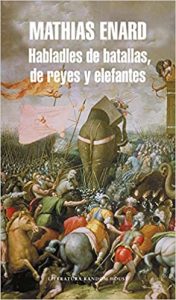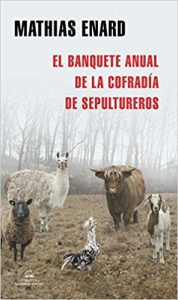Among the host of recent French writers with the prestigious Goncourt under the arm, Mathias enard it can be the most versatile and surprising. Along with the in addition to mutable in its plots, totally masterful in substance and form Pierre Lemaitre.
Enard tells us about history, learning, cultural miscegenation, ecology..., his critical vision permeates each of his novels, providing that sociological background that elevates any fiction proposal to a greater category, to the most widespread moral through the scenes where the narrative moves.
In addition to these sociological-tinged intentions, Enard is able to frame everything in an intensely humanistic vivid action. The psychological burden of his characters and their exposure to transcendent situations end up leading us down unfathomable paths.
And we get hooked on the edges of concepts as serious as death or guilt, but also on the gravity of love or hope, despite everything, with such profound literature that ends up making its way between opposite poles. Extremes that make more sense in the contradiction that shakes its characters like the weather vanes that we all are.
Top 3 Recommended Novels by Mathias Enard
Talk to them of battles, of kings and elephants
A great success in 2010 in France and now arriving in Spain with the validity of the imperishable works. Good creation always ages well.
A dazzling chronicle about an episode confined to oblivion: the adventures of Michelangelo in Renaissance Constantinople, which also serves as an extraordinary reflection on creation, the artist's passions and the point where two civilizations converge.
Upon landing in Constantinople on May 13, 1506, Michelangelo knows that he is defying the power and anger of Julius II, a warrior pope and poor payor, by abandoning the construction of his tomb in Rome. But how can he refuse the invitation of Sultan Beyazid, who, after rejecting Leonardo da Vinci's design, proposes to him to conceive a bridge over the Golden Horn?
This is how this novel begins, intimately linked to history, which starts from a real event and then tries to unravel the mysteries of that trip. Overwhelming as the meeting of Renaissance man with the beauties of the Ottoman world, precise and chiseled as a piece of goldsmith, Talk to them of battles, of kings and elephants it is the portrait of an artist in his splendor and, also, a fascinating reflection on the act of creating and the meaning behind an unfinished gesture towards the other shore of civilization.
Through the chronicle of these forgotten weeks of history, Mathias Enard outlines a political geography whose doubts continue to haunt us five centuries later.
Compass
The authentic is not the West. Any city in our world has long ceased to have a personality. A dusty feeling of commercial uniformity covers the big cities and it is difficult to find that authenticity that increasingly remains only for the people, for the inhabitants of the gray cities.
In his Vienna apartment, as it begins to snow over the city, the renowned musicologist Franz Ritter evokes everything he has lived and learned while his thoughts fly to Istanbul, Aleppo, Palmyra, Damascus or Tehran, places that have marked his intellectual and sentimental biography.
During this sleepless night, friends and loves, cursed musicians and writers, travelers and adventurous women of uncertain origin and destination parade through his mind, all touched by the spell of the Middle East. Of all of them, it is Sarah who occupies his deepest thoughts: Franz has been in love with this woman for twenty years, with whom he has shared an intense relationship marked by travel and oriental culture.
Deserving of the prestigious Goncourt Award, this enveloping and musical nocturnal novel, of generous erudition and bittersweet humor, is a journey and a declaration of love, a search for the Other in us and reaching out to build a bridge between East and West, between yesterday and tomorrow, in this present so fragile for both worlds. Enard pays tribute "to all those who, leaving for the Levant or the West, fell into the networks of difference to the point of immersing themselves in the languages, cultures or music they were discovering, sometimes even losing themselves in body and soul ».
Neighborhood
Much of Enard's novels have a historiographical point toward the literary. The idiosyncrasy, cultural evolution, even wars, everything always appears motivated in the writings that remain, whether they are victors or already defeated in search of their fairest revenge.
A novel with hints of mystery that finally becomes a fascinating presentation of the underworlds of here and there, of the West and the East, equalizing the human condition and highlighting creation, the artistic as the only thing that can be saved.
On a decisive night, Francis Servain Mirkovíc takes the train from Milan to Rome to sell a briefcase full of secrets to a representative of the Vatican and, if everything goes according to plan, change his life. Until now he has been a secret agent of the Zone, which began in Algeria and progressively ended up spreading through the countries of the Middle East. Fifteen years dealing with war criminals, agitators, terrorists and arms traffickers, with intermediaries and above all with himself, immersed in the intoxicating cycle of violence.
The train starts, and with it begins a long sentence that progresses without barely stopping, a stream of consciousness that explores space and time to unearth the vestiges of the Mediterranean wars. To the rhythm of the rattle of the train, the author outlines the memory of this spy in whose mind the executioners intermingle with the victims, the heroism with the anonymity, but also the painters and the literati with the friendships and the failed loves.
Other recommended works by Mathias Enard
The annual banquet of the Brotherhood of Gravediggers
Empty Spain is rather empty Europe or even the empty world, turning our backs on what we were to get rid of the last vestiges of humanity integrated with the environment. And so it goes. Well knows a Mathias enard which has made this plot an acidic as well as melancholic and lucid criticism of the future of our civilization. Or perhaps just a fascinating sample of what we were yesterday and today we could not be again.
To work on his doctoral thesis on life in the country today, the ethnographer David Mazon has left Paris to settle for a year in a remote village surrounded by marshes on the west coast of France.
While overcoming the discomforts of the rural world, David makes contact with the colorful locals who frequent the café-colmado to interview them. They are headed by Martial, the mayor gravedigger, and the host of the traditional banquet of the members of the Brotherhood of Gravediggers.
In this gargantuan feast where wines and delicacies go hand in hand with legends, songs and disputes about the future of the funeral service, Death curiously offers them three days of truce. The rest of the year, when the Grim Reaper takes hold of someone, the Wheel of Life throws their soul back into the world, to a future or past time, as an animal or as a human being, so that the Wheel continues to turn.
In this splendid and multifaceted novel, which combines great dose of humor and the well-known erudition of the author, Mathias Enard exhumes the turbulent past and the treasures of his native France through the last millennium of its history, but without losing sight of contemporary fears and with the hope of a tomorrow in which the human being be in harmony with the planet.




